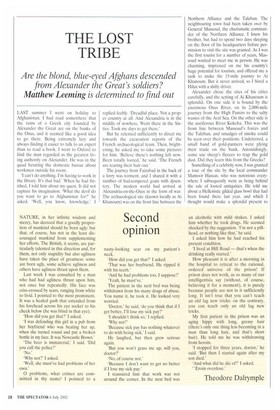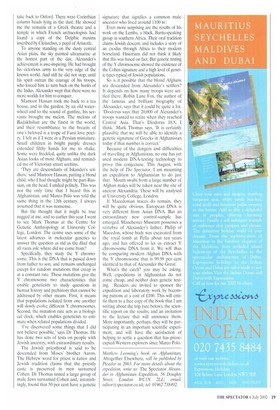THE LOST TRIBE
Are the blond, blue-eyed Afghans descended from Alexander the Great's soldiers?
Matthew Leeming is determined to find out LAST summer I went on holiday to Afghanistan. I had read somewhere that the ruins of a Greek city founded by Alexander the Great are on the banks of the Oxus, and it seemed like a good idea to go there. Being extremely lazy and always finding it easier to talk to an expert than to read a book, I went to Oxford to find the man regarded as the greatest living authority on Alexander. He was in the quad berating the domestic bursar about workmen outside his room.
I can't do anything. I'm having to work in the library. It's that bad.' When he had finished, I told him about my quest. It did not capture his imagination. 'What the devil do you want to go to Afghanistan for?' he asked. 'Well, you know, knowledge,' I replied feebly. 'Dreadful place. Not a proper country at all. And Alexandria is in the middle of nowhere. Went there in the Sixties. Took me days to get there.'
But he relented sufficiently to direct me towards the excavation reports of the French archaeological team. Then, brightening, he asked me to take some pictures for him. 'Believe there's nothing left now. Been totally looted,' he said. 'The French are tearing their hair out.'
The journey from Faizabad in the back of a lorry was torment, and I shared it with a number of bad-tempered goats with dysentery. The modem world had arrived at Alexandria-on-the-Oxus in the form of war. The archaeological site (known locally as Al Khanoum) was on the front line between the Northern Alliance and the Taleban. The neighbouring town had been taken over by General Massoud, the charismatic commander of the Northern Alliance. I knew his brother, but had to spend two days sleeping on the floor of his headquarters before permission to visit the site was granted. As I was the first tourist for a number of years, Massoud wanted to meet me in person. He was charming, impressed on me his country's huge potential for tourism, and offered me a tank to make the 15-mile journey to Al Khanoum. But it never arrived, so I hired a Hilux with a shifty driver.
Alexander chose the sites of his cities carefully, and the setting of Ai Khanoum is splendid. On one side it is bound by the enormous Oxus River, on its 2,000-mile journey from the High Pamirs to the salty wastes of the Aral Sea. On the other side is the auriferous River Kokcha. This was the front line between Massoud's forces and the Taleban, and smudges of smoke could be seen over their positions. Undeterred, a small band of gold-panners were plying their trade on the bank. Astonishingly, some use sheep's fleeces to trap the gold dust. Did they learn this from the Greeks?
Something of a celebrity now, I was granted a tour of the site by the local commander Mamoor Hassan, who was notorious everywhere I subsequently went as being behind the sale of looted antiquities. He told me about a Hellenistic gilded glass bowl that had been found there last year, and which I thought would make a splendid present to take back to Oxford. There were Corinthian column heads lying in the dust. He showed me the remains of a Greek theatre and a temple in which French archaeologists had found a copy of the Delphic maxims inscribed by Cleiarchus, a pupil of Aristotle.
To anyone standing on the dusty central Asian plain, the sky painted ultramarine at the hottest part of the day, Alexander's achievement is awe-inspiring. He had brought his victorious army to the very edge of the known world. And still he did not stop, until his spirit outran the courage of his troops, who forced him to turn back on the banks of the Indus. Alexander wept that there were no more worlds for him to conquer.
Mamoor Hassan took me back to a tea house, and in the garden, by an old waterwheel and to the sound of gunfire, his servants brought me melon. The melons of Badakhshan are the finest in the world, and their resemblance to the breasts of one's beloved is a trope of Farsi love poetry. I felt as if I were in a Persian miniature. Small children in bright purple dresses extended filthy hands for me to shake. Some were freckled, quite unlike the dark Asian looks of most Afghans, and reminded me of Victorian street urchins.
They are descendants of Iskander's soldiers,' said Mamoor Hassan, patting a blond child. who I had thought might be part-Russian, on the head. I smiled politely. This was not the only time that I heard this in Afghanistan, and Marco Polo was told the same thing in the 13th century. I always assumed that it was nonsense.
But the thought that it might be true nagged at me, and so earlier this year I went to see Mark Thomas at the Centre for Genetic Anthropology at University College, London. The centre uses some of the latest advances in molecular genetics to answer the question as old as the Iliad that all races ask: where did we come from?
Specifically, they study the Y chromosome. This is the DNA that is passed down from father to son, and remains unchanged except for random mutations that creep in at a constant rate. These mutations give the Y chromosome two characteristics that enable geneticists to study questions in human history and prehistory that cannot be addressed by other means. First, it means that populations isolated from one another will slowly evolve different Y chromosomes. Second, the mutation rate acts as a biological clock, which enables geneticists to estimate when related populations divided.
'I've discovered some things that I did not believe possible,' says Dr Thomas. He has done two sets of tests on people with Jewish ancestry, with extraordinary results.
The Jewish priesthood is said to be descended from Moses' brother Aaron. The Hebrew word for priest is kahen and Jewish tradition claims that the priestly caste is preserved in men surnamed Cohen. Dr Thomas tested a large group of male Jews surnamed Cohen and, astonishingly, found that 50 per cent have a genetic signature that signifies a common male ancestor who lived around 1100 sc.
Even more surprising are the results of his work on the Lemba, a black, Bantu-speaking group in southern Africa. Their oral tradition claims Jewish descent, and includes a story of an exodus through Africa to their modem homeland, Historians did not think it likely that this was based on fact. But genetic testing of the Y chromosome showed the existence of the Cohen signature and a high level of genetic types typical of Jewish populations.
So is it possible that the blond Afghans are descended from Alexander's settlers? It depends on how many troops were settled there. Robin Lane Fox, the author of the famous and brilliant biography of Alexander, says that it could be quite a lot, 'Diodorus says that 20,000 of Alexander's troops wanted to retire when they reached Central Asia. That's Diodorus 18.8, I think.' Mark Thomas says. 'It is certainly plausible that we will be able to identify a genetic signature of Greeks in Afghanistan today if that number is correct.'
Because of the dangers and difficulties of travelling in Afghanistan, no one has yet used modern DNA-testing technology to prove this conjecture. This August, with the help of The Spectator, I am mounting an expedition to Afghanistan to do just that. Mouth swabs from a large number of Afghan males will be taken near the site of ancient Alexandria. These will be analysed at University College, London.
If Macedonian traces do remain, they will be quite obvious. European DNA is very different from Asian DNA. But an extraordinary new control-sample has emerged. Manchester Museum possesses a vertebra of Alexander's father, Philip of Macedon, whose body was excavated from the royal tomb at Pella about ten years ago, and has offered to let us extract Y chromosome DNA from it. We will thus be comparing modern Afghan DNA with the Y chromosome that is 99.98 per cent identical to that of Alexander the Great.
What's the catch? you may be asking. Well, expeditions in Afghanistan do not come cheap, and neither does genetic testing. Readers are invited to sponsor the expedition and laboratory work by becoming patrons at a cost of £100. This will entitle them to a free copy of the book that I am writing about the trip (see below), the scientific report on the results, and an invitation to the lecture that will announce them. More importantly, perhaps, they will be participating in an important scientific experiment, and will have the satisfaction of helping to settle a question that has preoccupied Western explorers since Marco Polo.
Matthew Leeming's book on Afghanistan, Altogether Elsewhere, will be published by Picador in 2003. For more details about the expedition, write to: The Spectator Alexander in Afghanistan Expedition, 56 Doughty Street, London WC1N 2LL; email: editor@spectatorco.uk; tel: 01962 738492.



























































 Previous page
Previous page